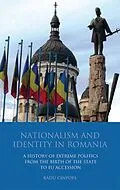The collapse of communism in Central and Eastern Europe produced a fundamental change in the political map of Europe. In Romania, nationalism re-emerged forcefully and continued to rally political support against the context of a long and difficult transition to democracy. Extreme right-wing party The Greater Romania Party gained particular strength as a major political power, and its persuasive appeal rested on a reiteration of nationalism and identity - and themes such as origins, historical continuity, leadership, morality and religion - that had been embedded in Romanian ideological discourse by earlier nationalist formations. Radu Cinpoes here examines the reasons for the strength and resilience of nationalism in Romania, from the formation of the state to its accession in the EU.
Autorentext
Radu Cinpoes is Lecturer in Politics and Human Rights at Kingston University, where he obtained his PhD in 2006. He specialises in nationalism and identity politics.
Inhalt
Preface
Nationalism - Conceptual Framework
Continuity and Discontinuity in the Romanian Nationalist Discourse
Tradition, Context and Transition to Post-communism
The Greater Romania Party: Background, Competition and Significance
The Party and its Leader
The Decline of the Greater Romania Party
Romania in the EU: The Future of Nationalism
Conclusions
